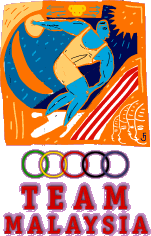LIVING & TRAVEL

Sieh Kok Chi
Secretary General, Olympic Council
of Malaysia
Sieh Kok Chi is the Secretary General of the National Olympic Council of Malaysia. He talks to Tripod about training, sponsorship, what it means to be a Malaysian Olympian, and his hopes for Atlanta 1996.
Tripod: How long has Malaysia been competing in the Olympics?
SKC: Malaysia has been competing in the Olympics since the Melbourne Olympic Games in 1956. Since then, we have participated in all the Olympic Games, except for the Moscow Olympics in 1980.
Tripod: How does the size of this year's team compare to other years?
SKC: The size of the team for the Atlanta Olympic Games is 36 athletes and 28 officials, making a total of 64 participants. This is the third largest contingent. The 1964 Tokyo Olympic Games had the largest, with 80 participants, followed by the 1972 Munich Olympic Games with 70 participants. In terms of athletes only, the 1996 team is also the third largest.
Tripod: Is there much encouragement in Malaysia for people to pursue a sport to an Olympic level?
SKC: There is much encouragement in Malaysia for people to pursue sports to Olympic level. The government of Malaysia provides a relatively large annual budget for training of athletes, for participation at international competitions and the construction of sports facilities. There are also many sponsors who provide funds for the training of elite athletes.
SKC: The Olympic Council of Malaysia is the umbrella organization in charge of multi-sports games, such as the Olympic Games and the Asian Games. It selects the athletes to participate in the Olympic Games and is the sole organization recognized by the International Olympic Committee in Malaysia to select and participate in the Olympic Games and other international games under the patronage of the IOC.
Tripod: In America, every company wants to sponsor the American Olympic Team. Would you say the same is true in Malaysia, or does the team have a lower profile? How does this affect equipment and resources athletes have to train with?
SKC: There is very good support from sponsors of the Malaysia Olympic Team. Although the amount of funds provided may not be very substantial, the support is good. Sufficient funds are provided by the Government, sponsors and the Olympic Solidarity for the Olympic athletes to train. Overall, the Malaysian Olympic Team has a reasonably high profile, considering that their chances of winning medals are rather remote.
Our target is to do better than in the Barcelona Olympic Games, where we won only one bronze medal.
SKC: The main and only hopes of the Malaysian Olympic team rest with the badminton players. Our men's doubles team is currently ranked second in the world. Our men's singles players are also medal prospects. Our target is to do better than in the Barcelona Olympic Games, where we won only one bronze medal, in the men's doubles event in badminton.
Tripod: What is the training process like for your athletes? Do most of them have other full-time jobs, or are they all in training full-time, year-round?
SKC: Most of the athletes carry out full-time, year-round training, especially the badminton players, who are semi-professional players. Athletes of other sports have full-time jobs but are given time off for training.
The US will win many medals, whereas the Malaysian contingent will be more than satisfied if we could win any medal.
SKC: The main difference between competing for the United States and competing for Malaysia is that the US will win many medals, especially gold medals, whereas the Malaysian contingent will be more than satisfied if we could win any medal. In practical terms, it means that a strong contingent will be confident and successful, with high self esteem. The weaker contingents will feel a little embarrassed and guilty if they perform badly or fail to reach the high expectations of the people in their countries.
Illustration by Federico Jordan, a freelance illustrator based in Mexico.

